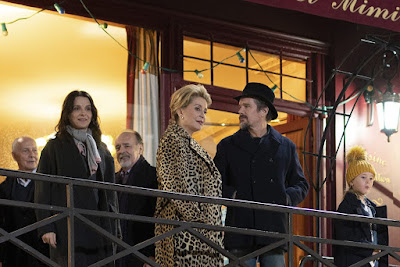I have long enjoyed the oddball movies of Catalonia filmmaker
Ventura Pons, who used to be something of a staple at the
FSLC's
Spanish Cinema Now. It has been several years since I've had the opportunity to see one, but the drought is now broken by the very limited release of his latest, ever-oddball work --
MISS DALÍ -- about narcissist nutcase and semi-talent,
Salvador Dalí and his family and "friends." I use that last word loosely, as I am not at all sure if the artist's treatment of those people closest to him could qualify as anything approaching real friendship. I once knew briefly one of the handsome young men the artist used and abused (both emotionally and physically, I suspect), and the result was not a happy camper.
Though the "Miss" in the title refers to Dalí's younger sister
Anna Maria, it could as easily apply to the artist himself, as campy and gay -- but closeted -- as they probably ever came. (Think
John Waters -- but without the closet, or a lick of the honesty and moral clarity Mr. Waters possesses.) Writer/director Pons, shown at right, has based his film, I am guessing, upon the written works of Anna Maria about her brother, her family and their life. His framework consists of a daylong-into-evening conversation between the aged Anna Maria (played with vigor and great feeling by
Siân Phillips, on poster, above, and below, left) and her long-time friend Maggie (played by
Claire Bloom, below, right). This conversation covers much of a lifetime, allowing incident after incident to be recounted, as we move back and forth in time from present talk to past happenings.
The conversation comes at quite an artistic cost, however, as the exposition here is so bald-faced as to be near shocking. And while Ms Phillips is quite marvelous, having been given the better selection of dialog, Ms Bloom is utterly wasted, having to sit quietly by murmuring little more than the likes of "Ah, yes, I remember" throughout.
The movie is saved in part by the energetic and very well-acted flashbacks, often shot in black-and-white (sometimes sepia-esque), with but a single color very subtly on display: the blue of the sea, a bit of green in the shrubbery, or maybe the rust shade of a dress. In these past-time scenes, Anna Maria is played by another wonderful actress, who seems to be making her full-length film debut here,
Eulàlia Ballart, above and below, center.
Ms Ballart beautifully communicates the longing of unrequited love (for playwright/poet
Federico García Lorca), as well as the gnawing, if quiet pain that builds when one is considered the lesser light in the family (first, a female; second, a non-artist). Lorca, who, as shown here, was in love with the unable-to-respond Salvador, is played by the lovely and graceful young actor
José Carmona (above, right, and below, left), who captures Lorca's yearning and passion, as well as, in his recitations, a fine understanding of the poet's work.
The film's liveliest performance is given by
Joan Carreras, as Salvador (above, right, and below). Carreras captures Dalí's zeal for notoriety and fame above all else (with money not far behind), and the actor's energy, wit and, yes, charm, go a long way in reminding us how much fun the artist could be. In small doses and for while.
The other actor who shines brightest here is Senor Pons' long-time performance collaborator,
Josef Maria Pou (below, right), who plays Dali's stern-but-way-too-forgiving-and-enabling father. Pou proves alternately angry, funny, caring and shocked, and he is, as always, marvelously entertaining.
Most of the drama here comes via the flashbacks. The exposition, which makes those flashbacks possible, is also somewhat draining (
Miss Dalí lasts over two-and-three-quarter hours).
TrustMovies was never bored, however. The lives and situations, as depicted here, are just too interesting, provocative and annoyingly enjoyable to look away from. And the locations, with their visual splendor, provide a most enjoyable, affordable vacation.
We also get glimpses of Salvador's wife, Gala (played by
Rachel Lascar, above, left, and below, right) -- a woman who, according to what we see here, almost no one liked -- except, of course, Salvador and Gala herself.
I wish we'd seen some of the artist's work. We don't, so I suspect that the permissions and copyrights must be locked up tighter than a drum. Or they're way too expensive for a Ventura Pons budget. While I often found the artist's work a lot of fun, certainly original, full of symbols and Freudian-as-hell, I also feel they are about as deep/profound as that puddle left by yesterday's brief rain shower. If only for his wretched treatment of Lorca (an artist whose work
was deep and profound), both before and after the poet was murdered by Franco's minions, Salvador deserves this film as his memorial.
From
ELS Films de la Rambla and running 168 minutes,
Miss Dalí opened this past weekend in New York City (at the
Cinema Village) and will open in Los Angeles at
Laemmle's Monica Film Center this Friday, November 23.






















































